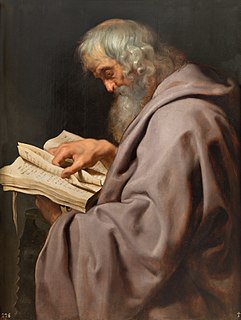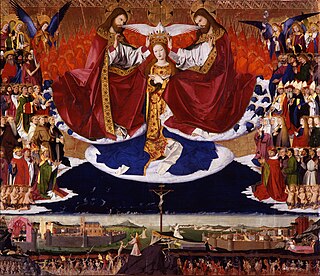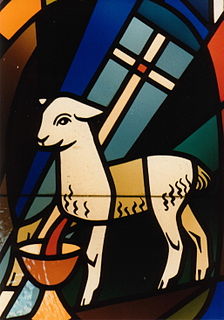
The Last Supper is the final meal that, in the Gospel accounts, Jesus shared with his Apostles in Jerusalem before his crucifixion. The Last Supper is commemorated by Christians especially on Maundy Thursday. The Last Supper provides the scriptural basis for the Eucharist, also known as "Holy Communion" or "The Lord's Supper".
John the Apostle was one of the Twelve Apostles of Jesus according to the New Testament, which refers to him as Ἰωάννης. Generally listed as the youngest apostle, he was the son of Zebedee and Salome or Joanna. His brother was James, who was another of the Twelve Apostles. The Church Fathers identify him as John the Evangelist, John of Patmos, John the Elder and the Beloved Disciple, and testify that he outlived the remaining apostles and that he was the only one to die of natural causes. The traditions of most Christian denominations have held that John the Apostle is the author of several books of the New Testament.

James the Just, or a variation of James, brother of the Lord, was an early leader of the Jerusalem Church of the Apostolic Age, to which Paul was also affiliated. He died in martyrdom in 62 or 69 AD.

Simon the Zealot or Simon the Cananite or Simon the Cananaean was one of the most obscure among the apostles of Jesus. A few pseudepigraphical writings were connected to him, and the theologian and Doctor of the Church, Saint Jerome, does not include him in De viris illustribus written between 392–393 AD.

Jewish Christians were the original members of the Jewish movement that later became Christianity. In the earliest stage the community was made up of all those Jews who believed that Jesus was the Jewish Messiah. As Christianity grew and developed, Jewish Christians became only one strand of the early Christian community, characterised by combining the confession of Jesus as Christ with continued observance of the Torah and adherence to Jewish traditions such as Sabbath observance, Jewish calendar, Jewish laws and customs, circumcision, Kosher diet and synagogue attendance, and by a direct genetic relationship to the earliest followers of Jesus.

Jude, also known as Judas Thaddaeus, was one of the Twelve Apostles of Jesus. He is generally identified with Thaddeus, and is also variously called Jude of James, Jude Thaddaeus, Judas Thaddaeus or Lebbaeus. He is sometimes identified with Jude, the brother of Jesus, but is clearly distinguished from Judas Iscariot, the apostle who betrayed Jesus prior to his crucifixion. Catholic writer Michal Hunt suggests that Judas Thaddaeus became known as Jude after early translators of the New Testament from Greek into English sought to distinguish him from Judas Iscariot and subsequently abbreviated his forename. Most versions of the New Testament in languages other than English and French refer to Judas and Jude by the same name.

Early Christianity covers the period from its origins until the First Council of Nicaea (325). This period is typically divided into the Apostolic Age and the Ante-Nicene Period. Early Christianity is also known as the Early Church by the proponents of apostolic succession, notably the Catholic Church, the Eastern Orthodox Church, Oriental Orthodoxy, Assyrian Church of the East, and Ancient Church of the East, in addition to some Protestant denominations.

Mary of Clopas, the wife of Cleophas, was one of various Marys named in the New Testament.

The primacy of Peter, also known as Petrine primacy, is the position of preeminence that is attributed to Saint Peter among the Twelve Apostles.

The history of the Eastern Orthodox Church is traced back to Jesus Christ and the Apostles. The Apostles appointed successors, known as bishops, and they in turn appointed other bishops in a process known as Apostolic succession. Over time, five Patriarchates were established to organize the Christian world, and four of these ancient Patriarchates remain Orthodox today. Orthodox Christianity reached its present form in Late Antiquity, when the Ecumenical Councils were held, doctrinal disputes were resolved, the Fathers of the Church lived and wrote, and Orthodox worship practices settled into their permanent form.

Catholic art is art related to the Catholic Church. This includes visual art (iconography), sculpture, decorative arts, applied arts, and architecture. In a broader sense, also Catholic music may be included. Expressions of art may or may not attempt to illustrate, supplement and portray in tangible form Catholic teaching. Catholic art has played a leading role in the history and development of Western art since at least the 4th century. The principal subject matter of Catholic art has been the life and times of Jesus Christ, along with people associated with him, including his disciples, the saints, and motives from the Catholic Bible.

Christianity in the 1st century deals with the formative years of the Early Christian community. The earliest followers of Jesus were a Jewish sect, which historians refer to as Jewish Christianity. The split of early Christianity from Judaism was gradual, as Christianity became a predominantly Gentile religion.

Christianity in the 2nd century was largely the time of the Apostolic Fathers who were the students of the apostles of Jesus, though there is some overlap as John the Apostle may have survived into the 2nd century and Clement of Rome is said to have died at the end of the 1st century. While the Christian church was centered in Jerusalem in the 1st century, it became decentralized in the 2nd century. The 2nd century was also the time of several people who were later declared to be major heretics, such as Marcion, Valentinius, and Montanus.

The following outline is provided as an overview of and topical guide to Christianity:

The history of Eastern Orthodox Christian theology begins with the life of Jesus and the forming of the Christian Church. Major events include the Chalcedonian schism with the Oriental Orthodox miaphysites, the Iconoclast controversy, the Photian schism, the Great Schism between East and West, and the Hesychast controversy. The period after the Second World War saw a re-engagement with the Greek, and more recently Syriac, Fathers that included a rediscovery of the theological works of St. Gregory Palamas, which has resulted in a renewal of Orthodox theology in the 20th and 21st centuries.

In Christian theology and ecclesiology, the apostles, particularly the Twelve Apostles, were the primary disciples of Jesus, the central figure in Christianity. During the life and ministry of Jesus in the 1st century AD, the apostles were his closest followers and became the primary teachers of the gospel message of Jesus.

Saint Peter, also known as Simon Peter, Simeon, Simon, or Cephas, according to the New Testament, was one of the Twelve Apostles of Jesus Christ, leaders of the early Christian Great Church. Pope Gregory I called him repeatedly the "Prince of the Apostles". According to Catholic teaching, Jesus promised Peter in the "Rock of My Church" dialogue in Matthew 16:18 a special position in the Church. He is traditionally counted as the first Bishop of Rome—or pope—and also by Eastern Christian tradition as the first Patriarch of Antioch. The ancient Christian churches all venerate Peter as a major saint and as the founder of the Church of Antioch and the Roman Church, but differ in their attitudes regarding the authority of his present-day successors.

The following outline is provided as an overview of and topical guide to the Catholic Church:



















